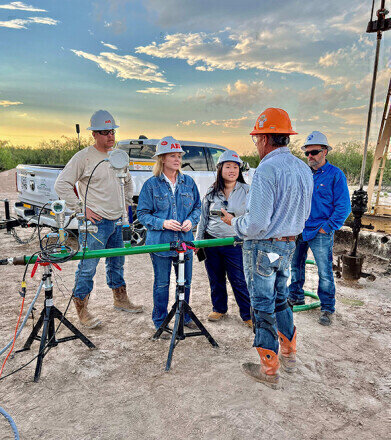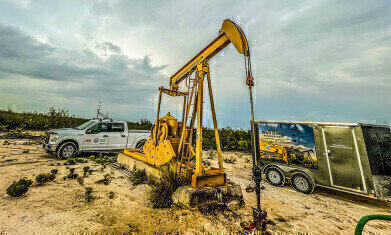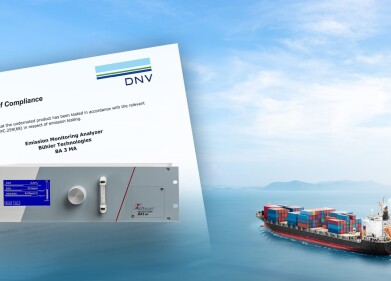-
 Once on-site, the ABB system measures methane concentration and flow with a measuring range as low as 180kg/h.
Once on-site, the ABB system measures methane concentration and flow with a measuring range as low as 180kg/h. -
 ABB’s high sensitivity analysers are transported by vehicle (using ABB Ability™ Mo-bileGuard™), drone (HoverGuard™), or backpack (MicroGuard™) to the site.
ABB’s high sensitivity analysers are transported by vehicle (using ABB Ability™ Mo-bileGuard™), drone (HoverGuard™), or backpack (MicroGuard™) to the site.
Measurement and testing
Sophisticated emissions monitoring technology to help tackle methane leakages from orphan oil and gas wells
Apr 20 2023
ABB’s advanced OA-ICOS™ laser-based technology, which is widely known for providing reliable measurements of greenhouse gases, is now being employed to address the massive environmental challenge of orphan oil and gas wells.
Orphan wells are decommissioned oil or gas wells that no longer have legal owners responsible for their maintenance. Due to their age and deteriorated condition, these wells can leak methane and other harmful greenhouse gases through their “plugs”. According to the United States Environmental Protection Agency (EPA), methane emissions from over 2 million inactive, unplugged wells, of which orphan wells are a subset, range from a CO2 equivalent of 7 to 20 million metric tons per year, roughly equivalent to the emissions of 2 to 5 million cars.
ABB’s emissions monitoring technology, which is typically used for gas leak detection by oil and gas companies and natural gas utilities, is now being used to identify and monitor orphan wells in the United States. By supporting the work on plugging decommissioned wells across the country, the technology helps in the fight against climate change.
To ensure the success of this initiative, ABB worked together with channel partner Winn-Marion to create a comprehensive approach that enables the identification, on-site qualification, and monitoring of orphan wells. At the heart of the system are ABB’s gas leak detection solutions, as well as a suite of flow computers, both used in tens of thousands of industrial plants worldwide to measure and report on emissions.
Initially, ABB’s gas leak detection system is used to locate orphan wells. Depending on their location, the high sensitivity analysers using OA-ICOS™ technology are transported by vehicle (using ABB Ability™ MobileGuard™), drone (HoverGuard™), or backpack (MicroGuard™) to the site. The system can detect methane emissions down to 1 part per billion (ppb).
Once on-site, it measures methane concentration and flow with a measuring range as low as 180kg/h. The flow from the thermal mass is logged and visualised on ABB’s gas flow computers, the control devices known in the industry for their extreme accuracy and reliability. In the post-plugging phase, methane emissions continue to be monitored.
A key advantage of ABB’s emissions monitoring technology is that it is fully audited by the Bureau of Land Management, which manages the Federal government’s onshore oil and gas program in the United States.
“ABB is dedicated to accelerating the pace of environmental programs that reduce emissions, especially in the oil and gas industry. Our work on this initiative is a great example of how technology can benefit the environment and help countries achieve their sustainability goals,” said Jacques Mulbert, Division President, ABB Measurement & Analytics.
With the help of ABB’s technology, organisations such as The Well Done Foundation, a non-profit that works to plug orphan oil and gas wells in the US, can detect leaking wells and, once the wells are capped, continue to monitor the sites to ensure they no longer emit harmful greenhouse gases.
The widespread contamination of land, air, and water from methane emissions can potentially harm ecosystems, wildlife, livestock, and people. In some parts of the United States, where towns are growing, housing has been built where oil and gas wells once stood. According to the Environment Defense Fund, an estimated 14 million Americans live within a mile of an orphan well.
Digital Edition
PIN 26.1 Feb/Mar 2025
March 2025
Analytical Instrumentation - Elemental Analysis for Quality and Process Control at Refineries, for Lubricants and Wear Metals in Engine Oils - Synthetic Lubricants: New Developments - Scaling...
View all digital editions
Events
Apr 08 2025 Birmingham, UK
Apr 08 2025 Kielce, Poland
Apr 08 2025 Ravenna, Italy
Apr 08 2025 Southampton, UK
Apr 08 2025 London, UK




















